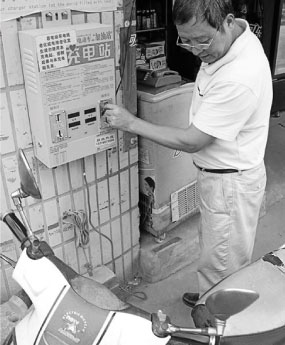Standards on electric bicycles can no longer cope with present-day needs. Mainland authorities are expected to relax limitation on net weight and top speed of e-bikes, Li Tao reports.
The fate of electric bicycles remains promising on the mainland despite some local regulators showing impatience toward the "trouble-makers" on the road. Drafts of the new national standards on electric bikes are expected to be finalized and submitted for approval in early November, according to Lu Jinlong, head of the Electric Car Commission under the China Bicycle Association.
|
 A old man recharges his electronic bike in Wuhan, Hubei province. The e-bike industry will boom as new regulations are expected to relax limitations. [Photo/China Daily] |
"The existing standards on electric bikes can no longer cope with the latest development of the industry. New rules in the new national standards will relax the limitation on net weight and highest speed of electric bikes," Lu told the China New Energy Electric Vehicle Summit held in Changxing county, Zhejiang Province, on Oct 10.
Electric bicycles today are still designed with a speed of less than 20 km/h and weigh less than 40 kg on the mainland.
But concerns over the outlook of e-bikes still remain as a recent national standard on light motorcycles stipulates that electric vehicles with speeds between 20 km/h and 50 km/h are motorcycles and will be banned on roads in many mainland cities - which, is very likely to clash with the upcoming rules on electric bikes.
Although experts and industrial leaders immediately cleared up the concerns saying that electric bicycles will not be defined as motor vehicles, the orderless prescriptions within the industry reflects the difficulties facing the birth of new regulations on electric bikes, given that the existing rules were adopted back in 1999, and have never been revised over the past 13 years.
On the sidelines of the electric vehicle summit, electric bike manufacturers told reporters in unison that the new energy vehicles development on the mainland has almost entered into a sort of dilemma stage - involving mixed responses from the public, local government and administrations.
China is the largest manufacturer and distributor of electric bicycles in the world. According to Ma Zhongchao, director of China Bicycle Association, electric bikes have become the most widely used means of transport in parallel to the country's urbanization process with annual sales reaching almost 30 million in the mainland these days.
"These figures underscore the strong product demand and enormous market potential, despite the fact that the current electric bike population on the mainland has already surpassed 140 million," said Ma.
But the electric bikes popularity does not necessarily translate into their acceptance by the government, particularly the traffic management departments. Although once touted as a solution to the country's transportation woes, the police in some parts of the mainland, nevertheless, treat electric bikes as silent killers given the rising number of accidents involving the use of electric bikes.
In 2011, Shenzhen banned electric vehicles on most of its streets on a six-month trial basis, after its traffic police bureau reported 64 deaths and 233 injuries in 268 accidents caused by e-bikes in the city, accounting for 15.7 percent of all road accidents throughout 2010.
The trial was once again adopted during April and June this year on some roads in Shenzhen. One month after the implementation, the city's traffic police bureau said the number of e-bike related accidents dropped by 30 percent, and the traffic order on the roads have also showed improvements after controls were imposed on the electric vehicles.
The traffic police bureau is the main force that opposes the electric bikes usage as well as on the outcome of the new national standards on electric vehicles, said Yao Li, general manager of Shenzhen Shenling Car Co. He said accidents rate increases involving e-bikes should not become an excuse for the administrative departments to ban their use in the entire industry.
"Electric bicycles are a kind of grassroots economy in China representing fundamental demand. Although some local governments including Guangzhou, Zhuhai and Shenzhen have forbidden the use of e-bikes on the roads, the move didn't really stint the purchases of the vehicles in these cities," said Yao.
